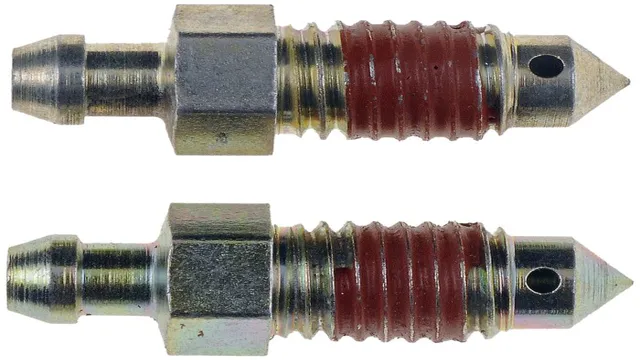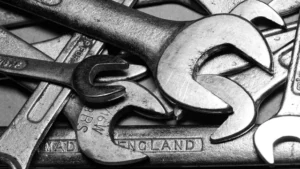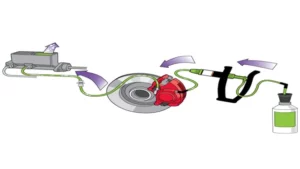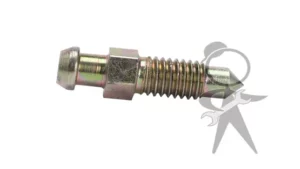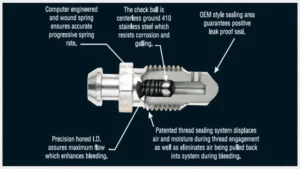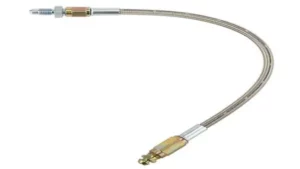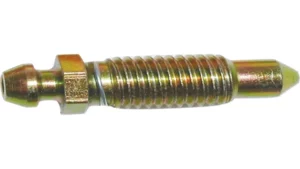You’re cruising down the highway, enjoying the view, when suddenly you hit the brakes and something doesn’t feel quite right. Maybe your vehicle is taking longer to stop, or the pedal feels spongy. These issues could be the result of air trapped in your brakes’ hydraulic system.
And that’s where brake bleeder screws come into the picture. If you’re unfamiliar with brake bleeder screws, don’t feel bad – they’re not exactly the most well-known car component. These little screws play a vital role in your vehicle’s braking system by allowing trapped air to escape.
But that’s not all they do. In this blog, we’ll dive into everything you need to know about brake bleeder screws, including what they are, how they work, and why they’re an essential part of your car’s braking system. So, buckle up and get ready to learn.
We’ll take you on a journey from basic brake system knowledge to expert-level tips on replacing brake bleeder screws. By the end of this blog, you’ll be an expert on all things brake-related. So, let’s hop into the driver’s seat and start learning about brake bleeder screws!
Are All Brake Bleeder Screws the Same?
When it comes to brake bleeder screws, it’s important to understand that not all of them are the same. While they may look similar in appearance, the variations in their design and specifications can make a big difference in performance and effectiveness. A brake bleeder screw is responsible for allowing air and excess fluid to escape from the brake system during maintenance or repairs.
Some screws are constructed with higher-quality materials which makes them more durable and resistant to corrosion. Others have different thread sizes and pitch, making them incompatible with certain brake systems. Additionally, some bleeder screws come with built-in check valves that prevent air from entering the brake lines during the bleeding process.
Therefore, it’s essential to ensure that the brake bleeder screw you choose is compatible with your brake system to avoid any issues during maintenance or repair. So, are all brake bleeder screws the same? No, they are not. It’s important to take into account the specific requirements of your brake system before selecting a brake bleeder screw.
Understanding Brake Bleeder Screws
When it comes to brake bleeder screws, not all screws are created equal. Depending on the make and model of your vehicle, you may need a specific type of brake bleeder screw that differs from other types. Some brake bleeder screws have a longer length or a specific thread size that is unique to certain vehicles.
It’s important to pay attention to the specifications of your vehicle’s brake system to ensure you’re using the right type of brake bleeder screw during any maintenance or repair work. Using the wrong brake bleeder screw could lead to leaks or improper brake fluid pressure, which could ultimately jeopardize the safety of your vehicle and its passengers. So, it’s important to understand your brake system and the specific needs it has when it comes to brake bleeder screws.
Don’t cut corners or assume that any old brake bleeder screw will do – take the time to do your research and ensure that you’re using the right one.
Different Types of Brake Bleeder Screws
When it comes to brakes, one important component that often goes overlooked is the brake bleeder screw. These screws are crucial for bleeding air out of the brake lines and ensuring that the brakes operate properly. However, not all brake bleeder screws are the same.
In fact, there are different types of brake bleeder screws that can be used depending on the make and model of your vehicle. Some examples of brake bleeder screws include hex-shaped screws, slotted screws, and Phillips-head screws. It’s important to know which type of brake bleeder screw your vehicle uses so that you can properly bleed your brakes.
Not using the correct type of brake bleeder screw can lead to leaks, reduced braking power, and other safety issues. So, always consult your vehicle’s manual or an experienced mechanic to determine the right brake bleeder screw for your vehicle.
Factors to Consider When Choosing Brake Bleeder Screws
If you’re wondering whether all brake bleeder screws are the same, the answer is no. There are several factors to consider when selecting the right brake bleeder screw for your vehicle. These factors include thread dimension, material, and coating, among others.
Thread dimensions vary depending on the make and model of your car. Thus, it’s essential to match the thread dimensions precisely to ensure a perfect fit. Moreover, the material and coating of the bleeder screw will determine its durability and resistance to corrosion.
Stainless steel and coated steel are excellent options for durability and longevity. In summary, different brake bleeder screws have different specifications, and it’s crucial to select the right one to ensure optimum performance and safety.
Material and Durability
When it comes to deciding on the brake bleeder screws for your vehicle, material and durability are two critical factors to consider. The right material and construction of the screws that allow you to bleed your brake lines can ensure dependable performance and long-term durability. Typically, brake bleeder screws are made from high-quality steel or brass material that delivers excellent strength and resistance to corrosion and rusting.
The right screws should be robust enough to withstand the high pressure produced by the brake system while also remaining resistant to wear and tear. By choosing durable and high-quality bleeder screws that are made of dependable materials, car owners can ensure the safety of their vehicles while also enjoying long-lasting performance. So, whether you’re replacing your old bleeder screws or upgrading your brake system, choose screws that are designed to provide you with durability, reliability, and peace of mind.
Thread Size and Pitch
When choosing brake bleeder screws, one essential factor to consider is thread size and pitch. The thread size refers to the diameter of the screw’s shank, while the pitch is the distance between the screw threads. It’s important to get the correct thread size and pitch, as mismatches can lead to leaks and brake failure.
To determine the right size, you need to measure the screw’s diameter and count the number of threads per inch. Common thread sizes for brake bleeder screws are 10mm, 3/8 inch, and 7mm. Ensuring that you have the correct size and pitch will provide a secure fit and prevent air or fluid from leaking out.
Don’t overlook this crucial factor when selecting your brake bleeder screws to ensure safe and efficient brake maintenance.
Overall Design and Functionality
Choosing the right brake bleeder screw can mean the difference between a successful bleed and a frustrating experience. There are several factors to consider when picking out the perfect screw for your needs. Firstly, ensure that you select the correct thread pitch, diameter, and length for your vehicle’s brake calipers.
Using the wrong screw can cause leaks and damage to your brake system. Additionally, look for screws made from high-quality materials like stainless steel or brass to avoid rust and corrosion. It’s also essential to choose a screw with a tight seal to prevent air from entering the system during bleeding.
Finally, consider the design of the screw head, as this can affect how easy it is to apply the necessary torque. Overall, taking the time to select the right brake bleeder screw will make your brake bleeding process smoother and more efficient.
Conclusion
On the surface, all brake bleeder screws may seem like identical little screws, but as with most things in life, it’s what’s on the inside that counts. The design and thread pitch can vary, making it important to use the correct screw for your vehicle’s make and model. So, just like how you wouldn’t settle for a mediocre date, don’t settle for the wrong brake bleeder screw.
Your brakes (and your safety) deserve the best.”
FAQs
1. What are brake bleeder screws used for in a braking system?
Brake bleeder screws are used to release air pockets from the brake lines and calipers, ensuring proper brake functioning.
2. Are all brake bleeder screws the same size?
No, brake bleeder screws come in different sizes according to the make and model of the vehicle.
3. How often should brake bleeder screws be replaced?
Brake bleeder screws do not usually require replacement, but they should be checked for signs of wear and damage during routine brake maintenance.
4. Can a brake bleeder screw be removed without a specialized tool?
Yes, a brake bleeder screw can be removed with a standard wrench, but it is easier and safer to use a specialized bleeder wrench.
5. What should be done if the brake bleeder screw is stripped?
If the brake bleeder screw is stripped, it will need to be replaced by a mechanic to ensure proper brake functioning.
6. Can brake bleeder screws be reused after removal?
While it is possible to reuse brake bleeder screws, it is recommended to use new screws to ensure proper sealing and prevent brake fluid leaks.
7. How much does it cost to replace a brake bleeder screw?
The cost of replacing a brake bleeder screw can vary depending on the make and model of the vehicle, but it typically ranges from $50-$100.
